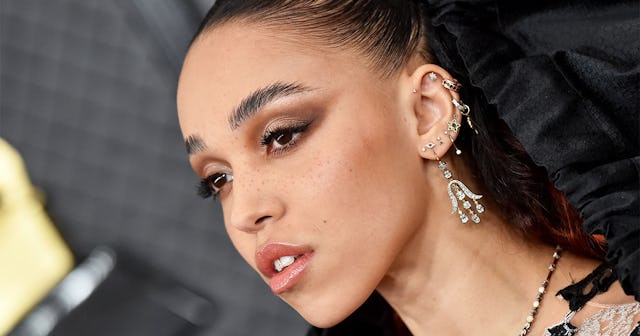FKA Twigs Says Shia LaBeouf Shot Stray Dogs In New Interview

The accusations are part of the lawsuit FKA twigs filed against her ex, actor Shia LaBeouf
Musician FKA twigs is sharing more disturbing details from her lawsuit against actor Shia LaBeouf, whom she dated between 2018-2019. In the lawsuit, she claims that in addition to physically assaulting her and emotionally abusing her throughout their relationship, LaBeouf also shot stray dogs during their time together, something he said he was doing in preparation for a film role.
The singer, born Tahliah Debrett Barnett, elaborated on her relationship with LaBeouf in a new interview with ELLE. She described his brand of “method acting” as extreme, and said that when he landed a role as a killer in The Tax Collector, he shamelessly bragged about shooting stray dogs to prepare for it.
When she confronted him about murdering innocent animals, he apparently resorted to gaslighting her by attempting to make her feel like she was overreacting. About killing animals. Something serial killers are known to do.
“I said to him, ‘That’s really bad. Why are you doing that?’” she said in the interview. “And he was like, ‘Because I take my art seriously. You’re not supporting me in my art. This is what I do. It’s different from singing. I don’t just get up on a stage and do a few moves. I’m in the character.’”
FKA twigs said that his condescending, manipulative response made her “feel bad, like I didn’t understand what it was like to be an actor or to do this … Method [acting technique].”
After The New York Times published the news of the lawsuit against LaBeouf, he responded to the claims via email. He admitted to being an abusive person, but that “many of these allegations are not true” regarding FKA twigs’ statements.
FKA twigs and LaBeouf met in the summer of 2018 on the set of his 2019 film “Honey Boy,” in which she co-starred. She has stated in the lawsuit, and has made public in interviews, that LaBeouf isolated and controlled her; woke her up in the middle of the night and strangled her; threatened to crash a car they were in unless she stated that she loved him; and knowingly gave her a sexually transmitted disease, among other allegations.
In the profile for ELLE, FKA twigs said LaBeouf forced her to sleep naked, and watch documentaries where women were violently murdered, dismembered, or raped before going to bed. She said in the fall of 2018, LaBeouf brought a gun into their bedroom.
“I was very intimidated living with him,” she said. “He had a gun by the side of the bed and was erratic. [I never knew what would] make him angry with me.”
Because of the gun in the room, she said she was scared to even use the bathroom at night for fear that he’d mistake her for an intruder and shoot her, according to the lawsuit.
After a while, she decided to send her manager a photo of the gun. “I thought to myself, ‘If he shoots me, and then if there is some sort of investigation, they will put the pieces together. I need to leave little clues.'”
She began reaching out to friends for shelter, telling them she was unsafe living with him. But LaBeouf didn’t make it easy — he often lashed out in jealousy when he discovered her talking with her friends and did everything he could to isolate her from them.
“He hated that I had an experience to myself [with] something that didn’t involve him, a memory that gave me joy,” she said. “He made me feel like I wasn’t allowed joy, basically. That’s what it boils down to: I wasn’t allowed joy unless it directly revolved around him.”
After getting an STD from LaBeouf, who had been intentionally hiding it from her throughout their entire relationship. She ended the relationship and was able to put physical distance between them once she went on a multi-city tour.
She tells ELLE it’s important for her to use her platform to raise awareness about domestic violence, and that it helps her own path to healing.
“It’s hard to do this publicly…but I want people to know my story,” she said. “If I can’t help people through my experience, it makes my experience 10 times worse. There has to be a point to this—a reason why this happened to me. It’s not just about my [personal] recovery.”
This article was originally published on